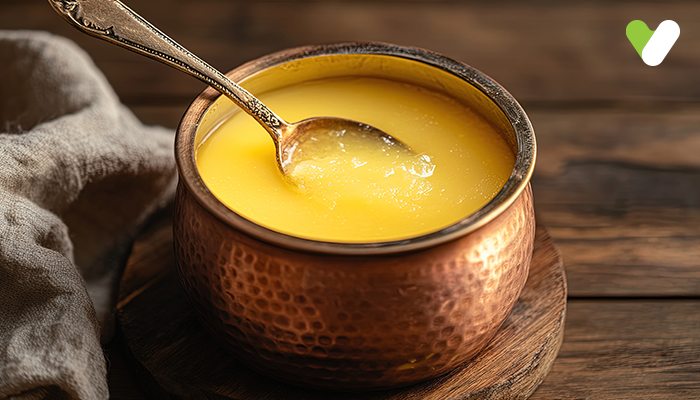What is ghee?
Ghee is a form of refined butter which originates from India and is frequently used in Middle Eastern, Pakistani, and Indian cuisine. Ghee is often used in cooking and frying because of its high smoke point, which means it can be heated to a high temperature without burning. It is also used in many traditional Indian dishes for its rich flavour and aroma. Ghee is sometimes used as a substitute for butter or oil in recipes and is also used in some traditional Ayurvedic practices for its effective health benefits. Ghee health benefits include improving digestion, reducing inflammation, boosting brain function, etc.
Additionally, ghee benefits for the skin include maintaining healthy skin. To get detailed information about the Benefits of ghee you can visit the LivLong website and type in the search box Benefits of ghee, Benefits of ghee for the skin, Ghee benefits for the skin, Benefits of eating ghee, Benefit of eating ghee daily, and Ghee health benefits.
Listed below are a few benefits of eating ghee:
1. Contains healthy fats
One of the potential benefits of eating ghee is that it is rich in butyric acid, a short-chain fatty acid that possesses anti-inflammatory properties and may help improve gut health. Additionally, ghee is rich in CLA or conjugated linoleic acid, which is a polyunsaturated fatty acid associated with a lower risk of heart disease, diabetes, and cancer.2. Helps the digestive tract
Ghee is often believed to have digestive benefits and is used in traditional ayurvedic medicine to treat digestive issues. Ghee can also help to stimulate the digestive system and help improve digestion. It is often used to treat digestive issues like constipation, bloating, and gas. Ghee is also rich in fat-soluble vitamins, which are important for maintaining a healthy gut lining and promoting good digestive health.3. Boosts immunity
Ghee is rich in fat-soluble vitamins D, E, A, and K, which are essential for maintaining a healthy immune system. Vitamin A, in particular, is important for preserving healthy mucous membranes, which serve as a defence against dangerous bacteria and viruses. Vitamin D is also important for immune system function, as it helps to activate immune cells and improve immune response.4. Contains essential vitamins
The benefit of eating ghee daily is that it is a good source of fat-soluble vitamins, particularly vitamins E, K A, D, and A. These vitamins are essential for various body functions and play a vital role in maintaining overall health.5. Has anti-inflammatory properties
Ghee contains butyric acid which may help reduce inflammation in the gut and other parts of the body. In particular, it has been shown to help reduce inflammation in the colon and improve symptoms of inflammatory bowel diseases (IBD) like Crohn's disease and ulcerative colitis.6. Has anti-cancer properties
Ghee is a good source of conjugated linoleic acid (CLA), a type of fatty acid that has anti-cancer properties. CLA has been shown to help inhibit the growth of cancer cells. Ghee is also rich in butyric acid, which has been shown to have anti-inflammatory properties and may help reduce the risk of certain types of cancer.7. Substitute for those who are lactose intolerant
Ghee can be a good substitute for those who are lactose intolerant because it is made by eliminating the milk solids from butter, leaving the butterfat. Lactose is a sugar found in milk, and it is mostly present in the milk solids that are removed during the process of making ghee.8. Keeps the skin healthy
One of the benefits of ghee for the skin is to preserve skin health. Ghee is a good source of beneficial fatty acids, including omega-6 and omega-3 fatty acids, which are important for keeping skin healthy. The fatty acids assist in maintaining the skin's natural barrier and keep it hydrated, which can help prevent dryness, flakiness, and other skin conditions. In addition, ghee is rich in vitamins A, D, E, and K, which are all important for healthy skin.9. Strengthen bones
Ghee is a good source of vitamin K2, which is important for bone health. Consuming vitamin K2 may help reduce the risk of osteoporosis, a condition in which bones become weak and brittle. Ghee is also a good source of calcium, which is essential for strong bones. Consuming enough calcium is important for maintaining bone density and reducing the risk of fractures.10. Helps in weight loss
Linoleic acid, or CLA, found in ghee is beneficial in combating obesity. CLA present in ghee, can assist some individuals reduce excess pounds and their body fat content. Omega-3 fatty acids, which are also abundant in ghee help with metabolism, weight loss and getting in shape more quickly. Ghee boosts the burning of body fat to provide energy. Faster weight loss is facilitated by this.
11. Proper brain function
Ghee is a source of healthy fats, including medium-chain triglycerides (MCTs) and omega-3 fatty acids, which are important for brain function and development. Additionally, ghee contains fat-soluble vitamins, including vitamin E and K2, which may have potential benefits for brain function. Vitamin E is an antioxidant that can help protect brain cells from oxidative damage, while vitamin K2 has been shown to improve cognitive function and memory.


